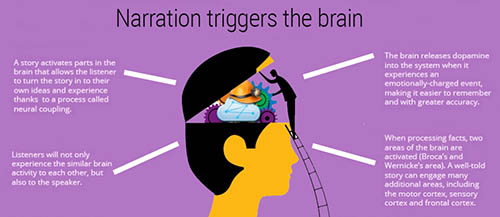Vivien Geyer, Koln-Germany
Narratives, myths, stories exist in all cultures around the world. They are part of our heritage, our history and our present living culture. They literally have the power to capture our attention, transcend boarders as well as becoming a very powerful educational tool. Our brain connects to others better when exposed to a story and also it learns better when listening to a story instead of mere facts.
Once upon a time there were only stories that taught us who we are, why we are here and how the world works. History was told and survived the ages, families were entertained and societies bonded. Children learned their past from the elders and one day, passed it on to the next generation. Nowadays, as we live in a multicultural world, we need to turn back and accept the fact that our heritage and origins are common. We can teach our brain to eliminate all our current differences.
In all levels of education all kinds of creating a story, in any form, writing it, participating in one or just listening to it, has the power to trigger our brain in many levels and get the message through. One feels more relaxed and keen to be engaged, to listen and learn what is going on and what will happen in the end. Imagination comes alive and all areas of the brain is affected. On the contrary if we listen to facts only our language processing center is activated.
According to science specific hormones are triggered while listening (reading or viewing) a story that makes us give special attention, understand and remember what was narrated to us.
It can be useful in all levels of Education from kindergarten to college. Educators can use any-or many, different forms of storytelling (traditional, drama participation or in digital form) and include them as an intergraded tool in their them in the process of teaching, in the challenging environment of the multicultural, diverse classroom of nowadays.
The social-bonding-understanding response of the brain is maybe even more important that the teaching-learning liberating process. Narrating a story, an incident, even a know historic fact will move a person’s instincts and imagination to actively engage and to think a story of their own. It is not a secret why we connect so strongly to a movie or a theater play and remember it for so long. All our senses are there present, our mind engages and the story becomes part of us.
“Stories have the power to bring all voices into the conversation in ways that other approaches may not be able to do.”
-Scott Abernathy, Associate Professor University of Minnesota
